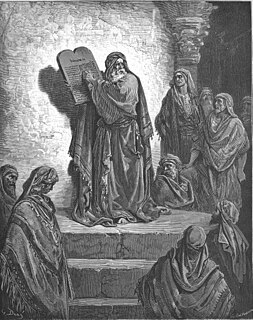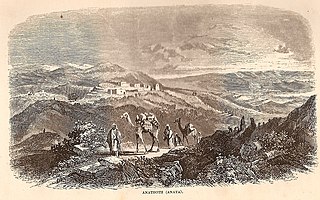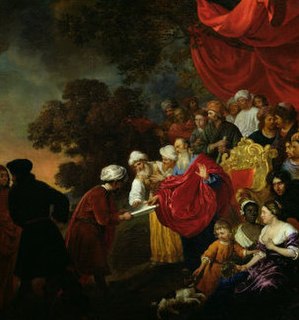Related Research Articles

Ezra, also called Ezra the Scribe and Ezra the Priest in the Book of Ezra, was a Jewish scribe (sofer) and priest (kohen). In Greco-Latin Ezra is called Esdras. According to the Hebrew Bible he was a descendant of Sraya, the last High Priest to serve in the First Temple, and a close relative of Joshua, the first High Priest of the Second Temple. He returned from Babylonian exile and reintroduced the Torah in Jerusalem. According to 1 Esdras, a Greek translation of the Book of Ezra still in use in Eastern Orthodoxy, he was also a High Priest. Rabbinic tradition holds that he was an ordinary member of the priesthood.
Malachi is the traditional author of the Book of Malachi, the last book of the Nevi'im (Prophets) section of the Tanakh. According to the 1897 Easton's Bible Dictionary, it is possible that Malachi is not a proper name, as it simply means "messenger".
Elam in the Hebrew Bible is said to be one of the sons of Shem, the son of Noah. The name is also used for the ancient country of Elam in what is now southern Iran, whose people the Hebrews believed to be the offspring of Elam, son of Shem. This implies that the Elamites were considered Semites by the Hebrews. Their language was not one of the Semitic languages, but is considered a linguistic isolate.
Amariah means "promised by God" in Hebrew. It was commonly used as a name of priests in the History of ancient Israel and Judah. It appear several times in the Hebrew Bible:
- One of the descendants of Aaron by Eleazar. He was probably the last of the high priests of Eleazar's line prior to the transfer of that office to Eli, of the line of Ithamar.
- A Levite, son of Hebron, of the lineage of Moses.
- A "chief priest" who took an active part in the reformation under Jehoshaphat ; probably the same as mentioned in 1 Chronicles 6:9.
- An ancestor of Ezra.
- One of the high priests in the time of Hezekiah.
- Great-grandfather of Zephaniah.
- Great-grandfather of Athaiah.
- One of the persons who sealed the covenant.
- One of the persons who had taken 'strange wives'.

Anathoth is the name of one of the Levitical cities given to "the children of Aaron" in the tribe of Benjamin. Residents were called Antothites or Anetothites.

According to the biblical narrative, Zerubbabel was a governor of the Achaemenid Empire's province Yehud Medinata and the grandson of Jeconiah, penultimate king of Judah. Zerubbabel led the first group of Jews, numbering 42,360, who returned from the Babylonian captivity in the first year of Cyrus the Great, the king of the Achaemenid Empire. The date is generally thought to have been between 538 and 520 BC. Zerubbabel also laid the foundation of the Second Temple in Jerusalem soon after.
Seraiah or Sraya is the name of several people mentioned in the Hebrew Bible, and a name with other non-biblical uses.

Nehemiah is the central figure of the Book of Nehemiah, which describes his work in rebuilding Jerusalem during the Second Temple period. He was governor of Persian Judea under Artaxerxes I of Persia. The name is pronounced or in English. It is in Hebrew נְחֶמְיָה, Nəḥemyāh, "Yah comforts".
Jeroham is a name which means "cherished" or "one who finds mercy". A number of people with this name are mentioned in the Hebrew Bible:
- The Father of Elkanah, and grandfather of the prophet Samuel — in 1 Samuel 1:1.
- The father of Azareel, the "captain" of the tribe of Dan — in 1 Chronicles 27:22.
- A Benjamite mentioned in 1 Chronicles 12:7 and 1 Chronicles 9:12.
- The father of Azariah, one of the "commanders of the hundreds" who formed part of Jehoiada's campaign to restore the kingship to Joash in 2 Chronicles 23:1
- A priest mentioned in 1 Chronicles 9:12;.
Malchijah is a biblical name belonging to several persons mentioned in the Hebrew Bible and means "Yahweh is King" or "the king is Yahweh".
Meshullam is a biblical masculine name meaning "Befriended".
Eliashib the High Priest is mentioned in Nehemiah 12:10,22 and 3:1, 20-21,13:28 and possibly the Book of Ezra of the Hebrew Bible as (grand)father of the high priest Johanan. Some also place him in different parts of Nehemiah including 12:23 and 13:4,7, but this is disputed. Nehemiah 3:20-21 places his home between the area of two working groups constructing the walls of Jerusalem on the south side of the city. He helped with the refortification of this wall. The size of his house indicated his wealth and high socio-economic status. This places him as someone who lived during the time of Nehemiah. In the year 445 BCE, Eliashib was the high priest when Nehemiah returned to Jerusalem in the 20th year of Artaxerxes I.
Joiakim is the name of a priest mentioned in the Hebrew Bible, in Deuterocanonical books, and in later extra-biblical sources. Reconstructing his role in history is complicated by a variety of claims made in these texts. The chronology of Joiakim's tenure as priest has been the subject of dispute, as has the question of whether Joiakim was high priest. The Hebrew Bible, which mentions Joiakim only in the Book of Nehemiah, Chapter 12, does not call him "high priest," though Josephus does use the term for him.
Adaiah was the name of eight individuals mentioned in the Hebrew Bible. The name means "Yahweh passes by."
- Adaiah, the father of Queen Jedidah. He was of Boscath, a town in the Kingdom of Judah mentioned in the Hebrew Scriptures. His grandson was king Josiah of Israel.
- An Adaiah mentioned in passing as the ancestor of a Levite named Asaph, in 1 Chronicles 6:41.
- An Adaiah mentioned in 1 Chronicles 8:21 as being the son of a Shimei in a Benjamite genealogy.
- A priest listed in 1 Chronicles 9:12 and Nehemiah 11:12. According to Cheyne and Black, it is possible that this same priest should appear in Nehemiah 12:6 or 7, but has been removed by a scribal error that left the name "Jedaiah" in its place.
- A descendant of Bani, listed in Ezra 10:29.
- Another descendant of Bani, listed in Ezra 10:39.
- An Adaiah, son of Joiarib, listed in Nehemiah 11:5.
- An Adaiah mentioned as being the father of Maaseiah in 2 Chronicles 23:1.

Ezra 8 is the eighth chapter of the Book of Ezra in the Old Testament of the Christian Bible, or the book of Ezra-Nehemiah in the Hebrew Bible, which treats the book of Ezra and book of Nehemiah as one book. Jewish tradition states that Ezra is the author of Ezra-Nehemiah as well as the Book of Chronicles, but modern scholars generally accept that a compiler from the 5th century BCE is the final author of these books. The section comprising chapters 7 to 10 mainly describes of activities of Ezra the scribe and the priest. This chapter follows Ezra's journey to Jerusalem and includes a genealogy of those returning with him.

Nehemiah 3 is the third chapter of the Book of Nehemiah in the Old Testament of the Christian Bible, or the 13th chapter of the book of Ezra-Nehemiah in the Hebrew Bible, which treats the book of Ezra and the book of Nehemiah as one book. Jewish tradition states that Ezra is the author of Ezra-Nehemiah as well as the Book of Chronicles, but modern scholars generally accept that a compiler from the 5th century BCE is the final author of these books. This chapter records in detail the rebuilding of the walls and gates of Jerusalem, starting from the north to west sections, continued to south and east sections until reaching the Sheep Gate again, the initial starting point.

Nehemiah 12 is the twelfth chapter of the Book of Nehemiah in the Old Testament of the Christian Bible, or the 22nd chapter of the book of Ezra-Nehemiah in the Hebrew Bible, which treats the book of Ezra and the book of Nehemiah as one book. Jewish tradition states that Ezra is the author of Ezra-Nehemiah as well as the Book of Chronicles, but modern scholars generally accept that a compiler from the 5th century BCE is the final author of these books. This chapter recounts the lineage of the priests and Levites and describes the dedication of the walls of Jerusalem, whose construction has been a primary concern since the beginning of the book.
References
![]() This article incorporates text from a publication now in the public domain : Easton, Matthew George (1897). Easton's Bible Dictionary (New and revised ed.). T. Nelson and Sons.
This article incorporates text from a publication now in the public domain : Easton, Matthew George (1897). Easton's Bible Dictionary (New and revised ed.). T. Nelson and Sons.{{cite encyclopedia}}: Missing or empty |title= (help)